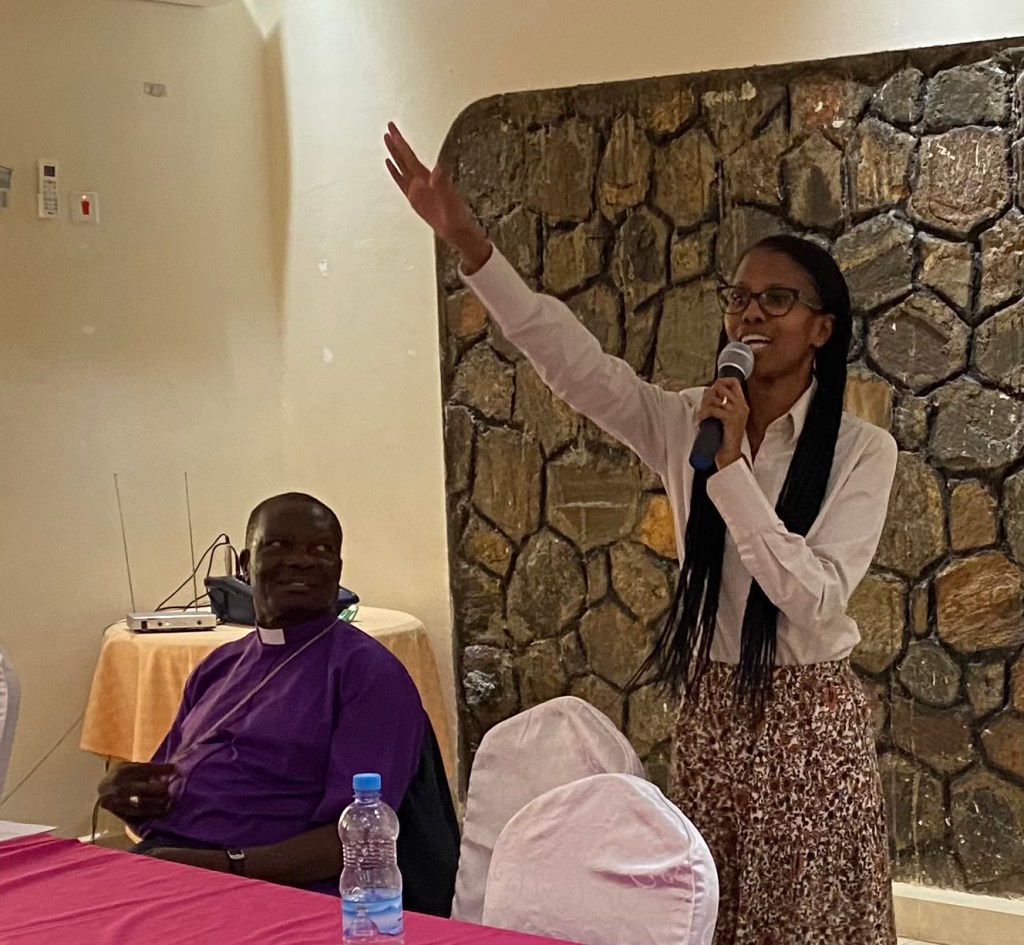Dear friends,
“God is wanting to raise up apostles and prophets in the Anglican Church.” These were the words of Revd Buli Wooley, my counterpart in South Africa, at the 2023 Anglicans Ablaze conference attended by many of their provincial bishops. It gave me a surge of hope as she described it. In and through the institutional mess of the Anglican Church God was looking to raise up people full of the Spirit’s power, uncompromised in convictions, ready and willing to follow Him wherever it goes.
Leaving aside for a moment what ‘apostles and prophets’ may be in our context it is too all easy for people to get trapped before they can grow into their calling. Some years ago I was contacted by a trusted intercessor who said she had a dream for me: In it I was strapped down in my basement in a dentist chair while two men in suits tried to operate on me. Fairly swiftly I checked this out with a prophetic dream interpreter from an older generation. The sense from this and other images in the dream was these were two different institutions trying to control me.
In an earlier chapter I talked about ‘Hagars’. I talked about them as people who have been used by ‘people of promise’ (like Abraham and Sarah) to short-circuit vision. Michael Everitt wrote to say:
I like your use of Hagar. It does presume that the ‘others’ are Abraham (people of promise). But often it is akin to Joseph. Joseph brings prophetic words and vision that so challenged the brothers that they seek to kill him, [but] then sell him into slavery.
But what men meant for harm, God used for good. The slave rose up, and preserved the nation.
Whether you have been thrown in a well, trapped in a chair or otherwise discarded, what God wants to raise up he will raise up. And he will transform you along the way.
If I were to define prophetic and apostolic at their simplest it would be people who can speak and act through God’s power… I’m not talking about ‘apostlic’ as people who are a bit entrepreneurial, or prophetic as people who like saying challenging things to power. Nor am I talking about those who hold an office in the institutions, although all of these things may overlap. I’m talking about slaves to Christ, laying down their own lives, marked by God’s empowering presence, evidenced through miracles, signs and wonders and prepared to persevere and suffer for it (cf 2 Corinthians 12).
Now that would be quite an Anglican church.
An army of slaves
Some years ago Pete Greig inadvertently launched a prayer movement with his vision of an army of slaves to the hurting and dying, an army of dangerously pure young wierdos and freaks who had given up on the game of minimum integrity, fasting essentials and who were free from materialism. They were willing to lay down their lives for a man on death row and pray like a dying man with groans beyond talking, with warrior cries, sulphuric tears and with great barrow loads of laughter!
Waiting. Watching. 24 – 7 – 365. Their DNA chooses JESUS. (He breathes out, they breathe in.) Their subconscious sings. They had a blood transfusion with Jesus. Their words make demons scream in shopping centres. Don’t you hear them coming?
Read/Watch more
At a similar time Martin Smith was inviting us to be history makers. We proclaimed that it is true today that cloudless skies will break, kings and queens will shake, dead men will rise and the blind will be set free as people stand with the fire of God, and the truth in hand. We announced that we’ll see miracles, we’ll see angels sing, we’ll see broken hearts making history, and wrapped up the anthem with “Yes it’s true and I believe it. We’re living for you.”


By 2001 Pete Greig’s poem was inspiring 100,000 underground churches in China, but Pete had to work this out in a very different context – in one of London’s ‘megachurches’ in Kensington and then in a plush commuter town where average house prices are close on £600,000. He also had to work it out in the rough and tough of life he documents so well.
I guess the question is: Does this army of slaves survive affluenza? Does it keep marching when God is on mute?
Are there any history makers?
Is it true today?
I want to shout “Hell, Yes it is true”… and see those demons shudder.
We’re only 20-30 years on and it often takes God a lot longer to form people than that. It may be easier to descend into a delusioned deconstructionism, but these (then) young men were onto something that won’t go away. A Kingdom that is forcefully advancing.
Why power is needed and not (just) a dirty word
Luke’s portrayal of Jesus is that he was conceived in power, baptised in power and ministered in power that amazed all around him. His disciples were not to do anything after his ascension until they too had been ‘clothed in power from on high’.
In Acts the apostles ‘receive power’, minister in ‘great power’, and even deacons appointed to serve at tables can be described as ‘full of grace and power’.
Peter describes how this power countered the power of the devil. “God anointed Jesus of Nazareth with the Holy Spirit and power, and how he went around doing good and healing all who were under the power of the devil, because God was with him.” Acts 10:38
Paul’s personal testimony to the Romans was that
“I will not venture to speak of anything except what Christ has accomplished through me in leading the Gentiles to obey God by what I have said and done, by the power of signs and wonders, through the power of the Spirit of God. So from Jerusalem all the way around to Illyricum, I have fully proclaimed the gospel of Christ.” (Romans 15:19).
And to the Corinthians: My message and my preaching were not with wise and persuasive words, but with a demonstration of the Spirit’s power, so that your faith might not rest on human wisdom, but on God’s power. (1 Cor 2:4-5). The kingdom of God is not a matter of talk but of power (1 Corinthians 4:20)
Crucially while this divine power enables us to demolish strongholds, arguments and pretentious that set themselves up against the knowledge of God, (2 Cor 10:3-5), Paul also says that the power at work in him/us is made perfect in human weakness so that there can be more of God and less of us. (2 Cor 12).
He warns Timothy about people who ‘have a form of godliness but deny its power’. Presumably in the context the power he was talking about that power had to do with the power of a changed life as he has just given a litany of sins that will be seen in the last days including loving pleasure, loving themselves and loving money, but without having real love, forgiveness, gratitude or holiness. A true form of godliness should change all that, even though (as he goes on to say) everyone who wants to live a godly life in Christ Jesus will be persecuted.
Understandably, and tragically, almost everything to do with ‘power’ in the Christian church at the moment is under scrutiny. That’s an obvious issue for a movement that was radically renewed in the 1980s by John Wimber’s teaching on Power Healing, Power Evangelism and Power Points.
Human power is unavoidable.
Human power dynamics begin as soon as two people come together. Human power needs handling with great care. It can easily corrupt. If we reflect on all of life’s relationships most of us have more power than we immediately realise. We’ll return to how power needs to be handled next week, although a good adage from the world of safeguarding is:
Hold power lightly | Use power wisely | Share power widely
Jeanette Plumb
And it is easy for a movement to shift from seeking God’s power to holding on to human power. As it gains momentum, money, and respect it has something to protect.
But what if Pete Greig and Martin Smith were right. What if God was looking for history making weirdos and freaks, whose goal isn’t power, miracles, history making or revival, but slowly and gradually as the refiners fire blazes whose goal becomes Jesus himself?
What if we feel like we’ve been locked away from this potential for years, stuck in an Egyptian jail with Joseph, a shepherd’s hillside with Moses, back in Tarsus with Saul, watching and waiting with Anna and Simeon (or maybe even stuck in a dentist chair while institutions operate on us). Slowly discombobulating. Dying to self. Realising we can do nothing apart from Christ.
What if all this was in God’s plan.
What if all this time God has been trying to teach us to be slaves in order to truly set us free.
What if the God who trains hands for war (Ps 144) is still raising up an army?
Just as the institutions start to crumble away, what if his plan is to once more raise up an order of people who are marked by the miraculous, who will suffer for His name, who are slaves of Christ?
What if our movement that began with ‘Power’ is supposed to still operate in that power, a power only to be safely yielded by those who know themselves to be truly weak?
Hear again the words of the dreamer… Let’s not forget what we are here for.
Don’t you hear them coming? Herald the weirdos! Summon the losers and the freaks. Here come the frightened and forgotten with fire in their eyes. They walk tall and trees applaud, skyscrapers bow, mountains are dwarfed by these children of another dimension.
Their prayers summon the hounds of heaven and invoke the ancient dream of Eden.
And this vision will be. It will come to pass; it will come easily; it will come soon. How do I know? Because this is the longing of creation itself, the groaning of the Spirit, the very dream of God. My tomorrow is his today.
My distant hope is his 3D. And my feeble, whispered, faithless prayer invokes a thunderous, resounding, bone-shaking great ‘Amen!’ from countless angels, from heroes of the faith, from Christ himself. And he is the original dreamer, the ultimate winner.
Guaranteed.
[The Vision: 24/7]
Previous Posts in this series: Foreword | introduction | Remember The Baby | The Bathwater Needs Flushing | Driven to Distraction by Success | Whoever Pays the Piper | Losing My Religion | Spiralling Out of Control | Look to the rock | Here Come the Generals
HTB Network Thesis in 30 Parts: Featuring: Origins | Renewal | Success Culture | Managerialism | Theology | Trajectories.

